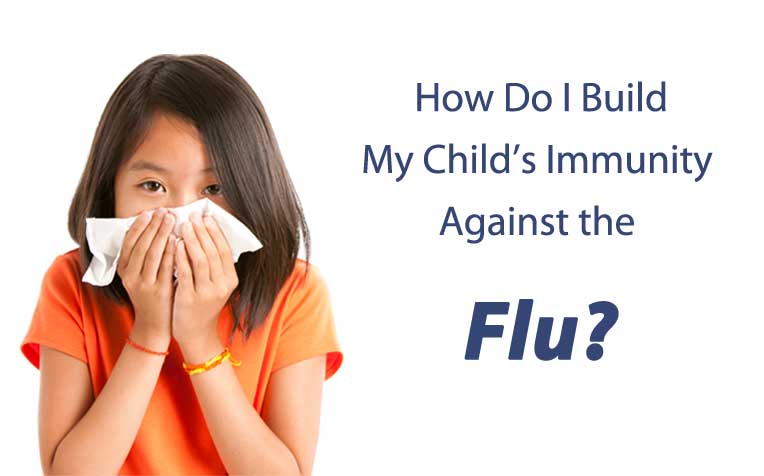1. Build immunity through balanced diet, physical activity, and adequate sleep (10-13 hours for young children).
2. Vaccinate before flu season, practice good hygiene, and wear masks when ill.
3. During flu, offer small frequent meals, ensure hydration, and consider chicken soup for symptom relief.

What are some ways to strengthen your child's immune system?
There are no proven foods to take or avoid to prevent one from catching the flu. However, ensuring a healthy lifestyle will help build up your child’s immune system.
“A well-balanced diet for children 0 to 18 years (as per the Singapore Health Promotion Board’s recommendations), will provide your child antioxidants like vitamins A, C, E, beta-carotene and zinc, which can help boost immunity to fight infections,” says Jasly Koo, Dietitian, from the Department of Nutrition and Dietetics at KK Women’s and Children’s Hospital, a member of the SingHealth group.
In addition, foods like garlic and mushrooms may also help immune function. Ensuring 150 minutes of physical activity a week also helps to strengthen your child’s immune system.
How to prevent the flu in children
Vaccination
The best way to prevent the spread of flu is through vaccination. As it takes approximately 2 weeks for a vaccine to be effective, your child (6 months to 5 years) should get vaccinated before the peak season starts.
According to the HPB, the flu peak season is generally from December to February and May to July.
Do note that the flu vaccine does not protect against bird flu or H7N9. Currently, there is no vaccine for this strain.
Getting enough sleep
Ensuring enough sleep and rest helps build your child’s immunity. The immune system can be weakened by elevated stress hormones, such as cortisol and adrenaline. Most toddlers and young children need 10 to 13 hours of sleep in a day, whilst most teens require about 9 hours of sleep.
Good personal hygiene
Good personal hygiene and habits also help prevent the spread of flu, such as
- Covering your nose and mouth with a tissue when you cough or sneeze and throwing away the tissue after using it.
- Avoiding public places and using a surgical mask when you are ill. Keep in mind that masks should be changed regularly every 4 hours or if it becomes moist or damaged.
- Washing your hands with soap and water, especially after coughing/ sneezing.
- Cleaning and disinfecting frequently-touched surfaces, especially when someone is ill.
Does taking supplements, especially Vitamin C, help to boost immune system and prevent children from having flu?
Some studies have shown that Vitamin C supplements may reduce the duration of flu symptoms, i.e. speed up recovery from the flu, but has no significant effect in preventing the flu.
As for zinc and echinacea, two popular supplements for flu relief and prevention, current studies show variable results.
By following the healthy eating from the Singapore Health Promotion Board, most children should be able to meet the Recommended Dietary Allowances (RDA) of vitamins and minerals through food, so there may not be any added benefit in giving supplements.
Over-supplementation can also put a child at risk for vitamin or mineral toxicity. So, if you do give supplements, give a supplement which is meant for children and do not exceed the recommended dose.
When a child is down with flu, what kind of diet should he/she be having?
A child’s appetite may decrease when he/she is down with the flu, so encourage small, frequent and well-balanced meals and snacks as tolerated by the child.
Ensure that he/she is getting sufficient fluids through
- water,
- soup and
- other non-caffeinated drinks like milk, barley water, chrysanthemum tea (avoid caffeinated drinks like cola drinks and tea as these have a diuretic effect and can make the child lose more fluids).
Make sure that the food is hygienically-prepared and well-cooked.
There may also be some truth in the age-old remedy of giving chicken soup, as chicken soup may have anti-inflammatory and anti-congestive effects, thus helping to relieve cold and flu symptoms.
Ref: O17
Contributed by


















 Get it on Google Play
Get it on Google Play